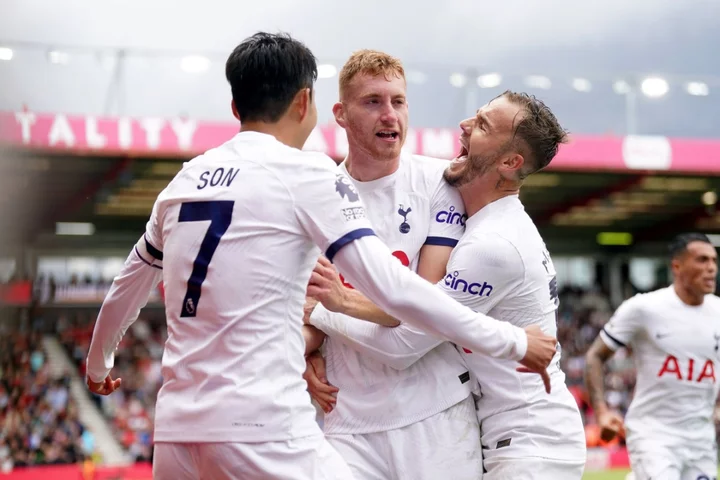
New-look Tottenham impress in win at Bournemouth
James Maddison opened his account for Tottenham before Dejan Kulusevski ended his goal drought to help the feelgood factor around Ange Postecoglou’s new-look team continue with a 2-0 win at Bournemouth. Maddison had starred in last weekend’s fine victory over Manchester United, but was spotted on crutches and in a protective boot later that same night. A sore ankle failed to stop Spurs’ new number 10 featuring on the south coast and he applied the finishing touch to an excellent team move after 17 minutes while continuing to pull the strings throughout this Premier League encounter. Bournemouth did improve after the opener but Kulusevski was able to clip into the bottom corner in the 63rd minute for his first goal since January to ensure Postecoglou’s side extended their unbeaten run to three matches. Maddison had been a pre-match doubt after he only returned to training on Friday, but he started at Vitality Stadium . After morning sunshine in Bournemouth, the heavens opened by the time referee Tim Robinson blew his whistle and it was a bruising start for Spurs. Destiny Udogie, Maddison and Cristian Romero all received early blows in the pouring rain, but it failed to knock the visitors off their stride and the opener arrived in the 17th minute. Pedro Porro and Yves Bissouma exchanged passes before the latter found Pape Sarr, who spotted Maddison’s late run and the England international was able to scuff his shot into the bottom corner from eight yards. While Maddison’s finish was scruffy, it still represented his first goal for Tottenham since a £40million switch from Leicester. Maddison had been denied by Neto two minutes earlier after a similar move but was running the show despite proving unpopular with the home fans. Sarr was next to go close but his deflected shot was saved after Maddison and Son combined and Spurs’ new captain Son sent a volley wide after 26 minutes. It was Maddison again at the heart of Tottenham’s next chance when Romero produced a fine tackle on Antoine Semenyo and the visitors’ number 10 led the counter-attacker before playing through Richarlison, but he was crowded out and the chance went begging. Richarlison headed Maddison’s corner into the side-netting minutes later, but Bournemouth – also at the start of a new era under Spaniard Andoni Iraola – did finish the first half strongly. Ryan Christie tested Guglielmo Vicario with a low effort and Philip Billing curled wide from 18-yards. The Cherries continued their momentum into the second half with Dominic Solanke firing a dangerous ball across the face of goal and Semenyo curling wide. Postecoglou had seen enough and Richarlison’s frustrating afternoon ended not long after he received a yellow card for a late tackle on Illia Zabarnyi with Ivan Perisic and Pierre-Emile Hojbjerg introduced by the hour mark. Son was now down the middle and the tactical tweak worked a treat with a one-two with Udogie resulting in Kulusevski making it 2-0. Udogie got to the byline and brilliantly cut back for Kulusevski, who flicked into the corner. Kulusevski let out a roar in celebration after his 63rd-minute effort and it was timely for Tottenham. Maddison could have put the game to bed seven minutes later but dragged wide before Perisic survived a VAR call for shoving Max Aarons. A raft of substitutions was followed by another downpour alongside thunder and lightening, but it failed to dampen Spurs spirits with Postecoglou’s side able to continue their promising start with a second consecutive win. Read More Charity boss speaks out over ‘traumatic’ encounter with royal aide Ukraine war’s heaviest fight rages in east - follow live Liverpool lucky with availability of centre-backs this season – Jurgen Klopp Robert Helenius failed drug test before fighting Anthony Joshua, Vada says Eddie Howe admits last season’s battles with Liverpool remain vivid memories
1970-01-01 08:00
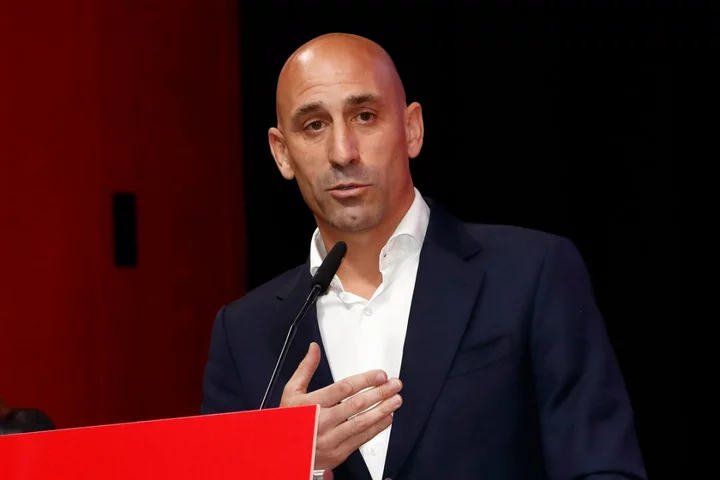
Spanish football’s ‘me-too moment’ is a mirror for the entire game
Right up until the moment that Luis Rubiales took the microphone at the Spanish federation on Friday afternoon, senior figures in Uefa were adamant he would resign. The expectation had even stopped some prominent football officials publicly speaking out. What followed, even for a sport like this, left many involved “speechless”. It says more than any statement, mind, that Rubiales’ “jaw-dropping political speech” – to use the words of one shocked source – probably wasn’t the most consequential moment of the day. All of this will eventually lead to real action, way beyond words or Spanish football. In terms of the most immediate effect, Fifa has now suspended Rubiales for 90 days and ordered him not to contact the player he kissed on the lips after the World Cup final, Jenni Hermoso. One of the most striking and important lines of Fifa’s statement announcing Rubiales’ suspension was the directive that he is not allowed contact her or her “close environment”. Four official complaints against Rubiales are now being investigated and they could ultimately see him banned from sport for anything between two to 15 years. “This is the end,” Miquel Iceta, Spain’s minister for culture and sport, told El Pais. “This can’t continue like this.” And yet it went on a bit longer. Iceta's comments were before the farcical late-night statement outlining how Rubiales’ federation would take legal action against the Futpro Union representing Jenni Hermoso, the player he kissed after the World Cup final, while insisting the president “has not lied” through the use of still images in an attempt to show Hermoso had initiated the incident. It felt like a point of no return, if only the latest. That deepens the question over why Rubiales didn’t just resign, although many would point to a total income from the role and connected positions of almost €1m a year. Others would point to a belligerent defiance when “cornered” that sums up his personality. It has similarly led to open comment in Spanish football about how this could be a precursor to a political career. Rubiales’ statements blaming “false feminism” undeniably played into the culture-war sentiment that Spain’s far-right party Vox has long been trying to court. This is what has finally set Rubiales in open conflict with the Spanish squad, after what has really been months of build-up. It has also brought the most significant and symbolic effect. The Spanish squad admirably came together as one, creditably supported by many of their colleagues around the women’s game as well as Spanish clubs and some male footballers, to declare they would not play for the national team while “the current management” remains at the federation. It has been quite a move – and almost the grim inverse of one of midfielder Aitana Bonmati’s supreme turns – for the country’s senior football body to turn the glory of a World Cup win into such a global public relations disaster, which is just about the most generous description. The women’s world champions currently don’t have a team. Going up against your now hugely popular winners is quite the position. The front page of Marca declared it all a “global embarrassment”, which echoes the mood of most of Spain. There are multiple other layers to this, a landmark moment for football as a whole. One of the main arguments has been what a rightful shame it is that the players’ glory has only seen a man’s behaviour being discussed, and that this man is who represents Spanish football on the global stage. It is in some ways both a separate story, though, and one more deeply fundamental to the squad’s achievements. Some of those achievements, of course, are successfully demanding better standards for women’s football that ultimately served their World Cup win. This is where there is a wider context to “little more than a kiss”, as Rubiales so provocatively put it. Even after Spain’s semi-final victory over Sweden, the federation chief was the first figure from the Spanish camp to publicly mention the player mutiny that framed this campaign, talking about “people with resentments” with a similarly provocative tone. It was impossible not to interpret all of this in terms of his own sense of personal vindication for standing by Jorge Vilda and facing down rebellious players, all of which translated into this belligerent triumphalism in the moment of victory. What else does the infamous crotch-grabbing symbolise other than “I’m the man”? And yet it is that very triumphalism that could lead to his downfall, “the end”, as Iceta put it. Those very celebrations have now led to a situation where Hermoso has now said: “I want to make clear that not in any moment did the conversation occur that Mr Luis Rubiales references, and much less that his kiss was consensual. In the same way I want to reiterate how I did in that moment that what happened was not enjoyable. “I felt vulnerable and a victim of aggression, an impulsive act, sexist, out of place and without any type of consent from my part. In short, I wasn’t respected.” Hermoso then spoke about how she, her family, friends and teammates “have been under constant pressure to come out with some sort of statement that would justify the acts of Mr Luis Rubiales”. While Victor Francos, the president of the Spanish High Council for Sport, had echoed the mood of many involved by saying nobody should “put the responsibility for this” on Hermoso, there was still a widespread pride in how she spoke. This is the other side of the shame Spain is feeling at how its football culture looks on the world stage. As regressive as much of the powerbrokers appear, the women’s teams have been pioneers. Spain can be proud of them for much more than winning a World Cup. They are affecting real change. Similarly, a lot of the country has looked at this and decided which side they are on. It is not that of Rubiales or Vilda. An admirable statement from Osasuna spoke of how the applause in the room “represents how far away Mr Rubiales and those who support him are from the majority sentiment of society”. On that, if Vilda’s managerial relationship with the players was complex before, what will it be like after effusively clapping Rubiales after his speech? All of this is why this entire story has had real cut-through, to the extent it has surprised many in Spain. Francos said: “We’re facing the ‘me too’ moment of Spanish football”. It also touches on bigger themes in global football. That is of course if global football snaps out of this apparent paralysis – although the paralysis is part of the point. The silence from some of the most senior people in football has been alarming. Uefa still have no official position on their vice president, although the explanation from those within the organisation is that Rubiales is only there because of a vote from the national federations, that they don’t want to interfere with a member association, and that do they want to cut across Fifa when the global body has opened a case. “The optics are bad if they say nothing,” one source conceded. It sums up the mood of many football figures, who all echoed a description of Uefa president Aleksander Ceferin as “such a disappointment”. Nor has there been any public comment from the Football Association, even though chair Debbie Hewitt was right beside Rubiales in her new role as Fifa president as all of this was happening. Another explanation there is the expectation he would resign and that Hewitt is now likely to be a witness in Fifa’s investigation. There has then been the widespread silence from the men’s game, other than admirable exceptions like Borja Iglesias, Isco, Hector Bellerin and Javier Aguirre. The contrast has already been drawn with how activist women’s players are by contrast, with one agent privately confiding that most male footballers only ever take on a cause if it suits their public relations purposes. “It’s a low bar but how many current men’s players ever talk up?” This is in part why this story has gone well beyond Spain. Football faces a crisis of leadership and vision, that has directly facilitated many existential threats to the sport itself, at least as regards the positive community form we know it from most of its history. Rubiales really reflects a type of man – and it is always a man – that rises to senior administrative roles in football, and doesn't seem to have the foresight, let alone other qualities, to properly serve the game as a whole. It is another vintage example of the sport mirroring society in terms of patriarchal structure, of course, but what is so troubling is how its community values could still be so positive. As the most prominent examples, what has been the response to sportswashing? What has been the response to the corrosive influence of private equity and other forms of a very Western capitalism? What has been the response to multi-club projects and how they distort club identities? What has been the response to the problematic concentration of the vast majority of football’s wealth in the men’s game in western Europe? What has been the response to the destructive erosion of competitive balance? Bar mostly waving all of this through, the most common response has just been to add more games and competitions, so even more money swirls around the top end. It has lamentably become a sport that is only ever exploiting its own immense popularity, rather than using it for the good it could do. And yet that’s the other side of such popularity, and when something spreads among more people like that. Those in charge can lose control of it. The development of the women’s game has led to that more prominent activism previously missing. This multi-layered story may well end up the most emphatic proof of that. It may end up a victory that goes further than the World Cup itself. Read More Spanish FA threatens legal action over Jenni Hermoso ‘lies’ as World Cup kiss row deepens Spain’s World Cup winners refuse to play until Luis Rubiales is removed
1970-01-01 08:00
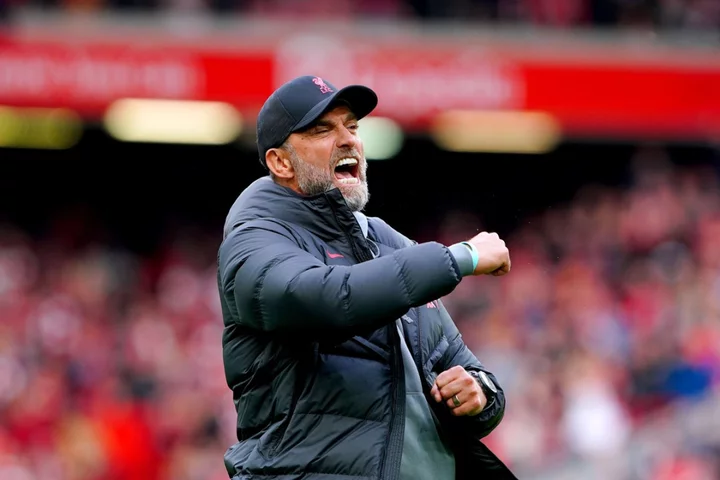
Liverpool lucky with availability of centre-backs this season – Jurgen Klopp
Jurgen Klopp admitted Liverpool must be “lucky” with the availability of their centre-backs this season as he hinted he was unlikely to add to his options before the transfer deadline. Ibrahima Konate is a doubt for Sunday afternoon’s trip to Newcastle because of a muscular problem and Joe Gomez or Joel Matip could instead partner Virgil Van Dijk at the heart of the Reds’ defence. Nat Phillips is another alternative but Klopp is well aware that a shortage of options and a spate of injuries could spell trouble as he had to get creative with his backline during the 2020-2021 season. A total of 20 different combinations were used during the turbulent campaign and Klopp is keeping everything crossed that he does not have to deal with a defensive crisis in the forthcoming months. “In an ideal world, we have six, seven, eight centre-halves and cover for absolutely everything,” the Liverpool manager said. “No, we need to be lucky with injuries, there is no doubt about that. “I have no doubt about the quality of the boys we have. We have (academy player) Jarell Quansah, a super-talented player, available as well. “In this moment we are covered but it is not dreamland where you can be prepared for absolutely each situation. We had to learn that in the past as well a couple of times. “We will try to do our absolute best to have a squad for next week, a squad for us where we can react on pretty much everything. Is that possible? We will see.” Liverpool were the only side to do the double over a Newcastle side that lost just five times in the Premier League and qualified for the Champions League last season. Despite their rapid improvement under Eddie Howe, Newcastle are on a 13-match winless sequence against Liverpool stretching back to December 2015 – although Klopp is wary of what they will face this weekend. He feels two of their signings in particular this summer were among the shrewdest of any team. The speed they have is really good. Newcastle, since last year at least, they don’t concede a lot but score. So that’s a proper game Jurgen Klopp “Newcastle are an incredibly strong team, qualified for the Champions League, fully deserved,” Klopp said. “Super development under Eddie Howe, I have to say. Eddie is a super coach, a super manager. “Smart business. I don’t want to miss anybody but probably the two standouts in this window: (Sandro) Tonali and (Harvey) Barnes. Really good business. “The speed they have is really good. Newcastle, since last year at least, they don’t concede a lot but score. So that’s a proper game.” While Thiago Alcantara and Curtis Jones are missing once again, Klopp will be able to call upon fellow midfielder Alexis Mac Allister after his red card in the 3-1 win over Bournemouth was overturned. Mac Allister – signed from Brighton in the summer for £35million – was shown a straight red by referee Thomas Bramall after catching Bournemouth midfielder Ryan Christie on the foot at Anfield last weekend. “When I saw the pictures back I was pretty sure that it’s not a red card but that doesn’t mean then immediately that our appeal will be successful,” Klopp added. “You don’t have that a lot of times, that pretty much everybody agrees this is not a red card and should not be a red card. Harsh tackles should always be punished, I absolutely support that 100 per cent. “But it was not a harsh tackle, it was just a touch in the situation. It was a massive relief when I heard that it is overturned. Very good news.” Read More Charity boss speaks out over ‘traumatic’ encounter with royal aide Ukraine war’s heaviest fight rages in east - follow live Robert Helenius failed drug test before fighting Anthony Joshua, Vada says Eddie Howe admits last season’s battles with Liverpool remain vivid memories Juanma Lillo says Man City ‘well managed’ as he fills in for Pep Guardiola
1970-01-01 08:00
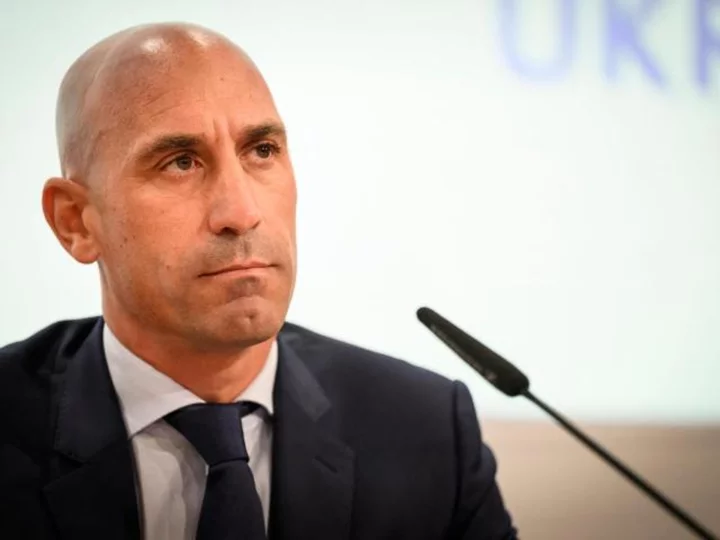
Spain's football federation accuses World Cup winner of lying about kiss from president
Spain's football federation has threatened to take legal action against one of the country's star players, Jennifer Hermoso, for her comments about its president Luis Rubiales.
1970-01-01 08:00
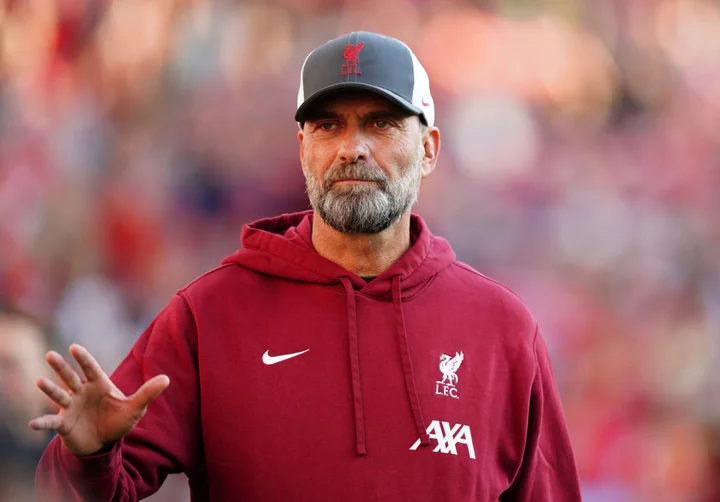
Liverpool are under pressure from Saudi Arabia – on and off the pitch
Jurgen Klopp finds himself under attack from Saudi Arabia on two fronts: one new, one even newer. He is entirely complimentary about one – Eddie Howe’s fast-improving Newcastle side – while calling for help in another respect. Klopp believes Fifa should act to bring the Saudi Arabian transfer window in line with its English equivalent. The acquisitiveness of their newly super-rich clubs has already disrupted his summer once; when, after beginning his midfield rebuild with the auspicious acquisitions of Alexis Mac Allister and Dominik Szoboszlai, he was stripped of Fabinho and Jordan Henderson, two he intended to keep. Now there is the prospect of a raid for Mohamed Salah, perhaps after 1 September, when it would be too late to replace him. His suitors are Al-Ittihad, a club run by the Saudi Public Investment Fund, who own 80 percent of Newcastle. Klopp is remaining defiant. “Mo Salah is a Liverpool player and essential for everything we do,” he said. “We don’t have an offer. If there would be something, the answer would be no.” Saudi spending power would look still more transformative if each of Klopp’s definitive front three – Sadio Mane, Roberto Firmino and Salah – were to move to the Pro-League in the same summer. Its influence is apparent in the North-East as well as the Middle East, however. Liverpool head to St James’ Park on Sunday after winning the battles against Newcastle, beating them home and away last season, but losing the war. They were forced out of the Champions League places by a rising force. Newcastle, Klopp thinks, are no one-season wonders. They are here to stay. “Most definitely,” he concurred. The changing landscape has made it harder for imperilled Liverpool in a division where others are spending, when they operate by different financial parameters. “And Chelsea,” he noted. “And Manchester United in the future. We have to [live within our means]. We cannot put sticks around the area and hope that no one will run through. That’s how it is: I have no problem with that. As long as it is all by the rules I have no problem. In the end it’s the circumstances, it could be different but it’s all about what you make of it.” And, as he readily admits, Newcastle have made a lot of their budget. They have spent around £400 million in four transfer windows under Howe. There was a hint from Klopp that their spending spree could have been more like Todd Boehly’s billion-pound exercise in incoherence. Instead, Newcastle’s buying has been underpinned by intelligent thinking. “So far they have not done crazy business,” said Klopp. “I have to say nobody knew exactly what would happen after [the takeover] but so far I don’t think they have done crazy business. One of those windows where people thought it would look like the Chelsea windows rather than the Newcastle window. They have brought in fantastic players like [Alexander] Isak, [Sven] Botman, Bruno [Guimaraes]: really smart business, piece by piece. And then this year [Sandro] Tonali and [Harvey] Barnes, and they can swap strikers between Isak and [Callum] Wilson, which is impressive. But they still have players from before like [Miguel] Almiron and [Sean] Longstaff. So, yes, they did business, and it was clear - could the Newcastle of before have done it? Probably not.” There are certain similarities with some of Liverpool’s recruitment over the years: buying improving players, rarely from the superpowers, for what can soon look bargain prices. Liverpool became champions of first Europe and England in part because, where there was little margin for error, they rarely erred. “There was one year when money was less of an issue because Phil went to Barcelona so we could do sensational transfers,” Klopp said, and Philippe Coutinho’s £142m sale financed the arrivals of Alisson and Virgil van Dijk. “But otherwise we have always spent to improve the team. With business, we have had to do it our way. Our situation is great, just not in comparison to the other teams you mentioned. We have to be on point. There is not a lot of space for failure.” Now, once again, his plans are taking shape, with Wataru Endo the belated replacement for Henderson and Fabinho, after Liverpool failed in bids for Moises Caicedo and Romeo Lavia, but with the risk that a sudden departure of a player of Salah’s standard could create further problems. “I was always glad when transfer windows are over,” Klopp reflected. “I can’t remember a transfer window where every single person was happy. I have to improve the squad, I know, but I have all the information around and I know what is possible and not possible. It is not my job to complain. It is my job to take the team we have at the end of the transfer window and make the best of it.” Which he has tended to do against Howe, with 10 straight wins. Newcastle have only suffered four home league defeats under the Englishman, but two were to Klopp and Liverpool. And while the job of managing Liverpool and of securing top-four finishes has got harder in other respects, at least he faces less opposition on Sunday. When he looks across to the home dugout, only one man will be on his feet, instructing the Newcastle players. Klopp had quipped that the new regulations were designed to stop the United tag team of Howe and Jason Tindall. “It was a joke,” he said. If Liverpool’s anthem dictates that he will never walk alone, Howe now has to stand alone. Read More He’s essential to Liverpool: Jurgen Klopp dismisses Mohamed Salah transfer talk Liverpool adamant Mohamed Salah is not for sale Would a transfer to Man United or Liverpool suit Ryan Gravenberch most? Eddie Howe urges Bruno Guimaraes to learn from social media criticism He’s essential to Liverpool: Jurgen Klopp dismisses Mohamed Salah transfer talk Jurgen Klopp makes definitive statement on Mohamed Salah transfer saga
1970-01-01 08:00
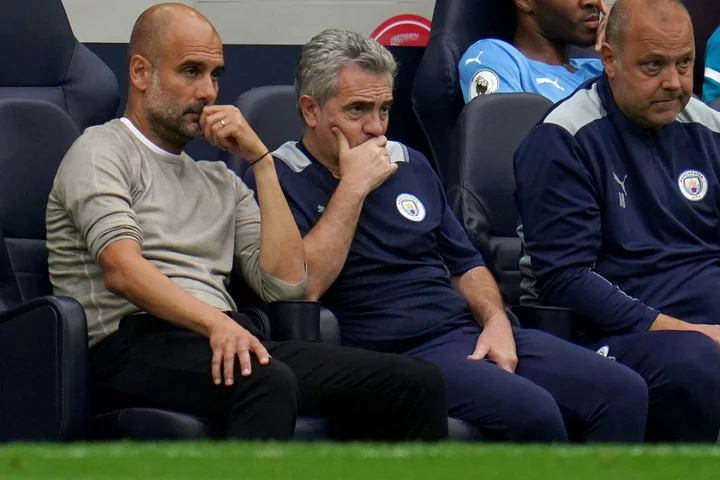
Juanma Lillo says Man City ‘well managed’ as he fills in for Pep Guardiola
Juanma Lillo will introduce himself to the Premier League at large on Sunday as he takes charge of champions Manchester City in Pep Guardiola’s absence. Guardiola’s little-known number two will call the shots from the dugout as the treble winners travel to Sheffield United without their influential manager. Guardiola is recuperating in Spain after undergoing back surgery earlier this week and so Lillo, who only rejoined the club this summer after a year away, finds himself in the spotlight. The experienced 57-year-old has had a varied and interesting coaching career, working in countries including Mexico, Chile, Colombia, Japan and China as well as his native Spain. He first joined Guardiola’s backroom staff after the departure of Mikel Arteta in 2020 and spent two years at the Etihad Stadium before leaving to take up a post in Qatar. City swept to Premier League, Champions League and FA Cup glory without him but Guardiola sought to bring him back after the exits of Enzo Maresca and Rodolfo Borrell at the end of the campaign. The pair have been friends since Guardiola played under Lillo at Mexican side Dorados de Sinaloa and were keen to work together again. “When I left was more of a ‘see you later’,” said Lillo at a press conference. “He’s someone very special to me, not only in footballing terms. “I am here to be with someone who’s been very important in my life.” Lillo recognises he has returned to a very strong set-up and is determined to do his best to ensure it remains that way. He said: “A good team without good players is impossible, but at the moment we have good players and a really good coach. It’s very well managed. “The way we train has a lot to do towards the way we play. That’s how we do it. “Things might not always go our way, but I can assure you that we’re going to continue doing things the right way.” Bernardo Silva, who signed a new contract at City this week, is available again for the trip to Bramall Lane after illness. New signing Jeremy Doku could come into the reckoning but John Stones and Kevin De Bruyne are sidelined. Read More Charity boss speaks out over ‘traumatic’ encounter with royal aide Ukraine war’s heaviest fight rages in east - follow live Eddie Howe admits last season’s battles with Liverpool remain vivid memories On this day in 2014: Man Utd break British record to sign Angel Di Maria Daniel Dubois aiming to ‘bully and shake up’ Oleksandr Usyk in title showdown
1970-01-01 08:00
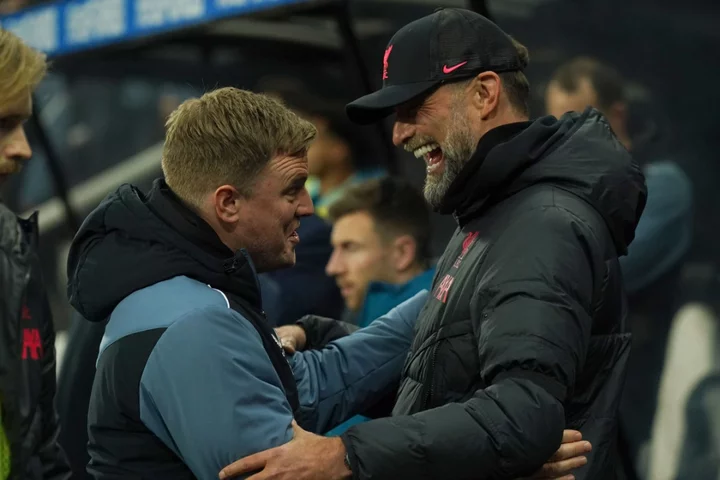
Eddie Howe admits last season’s battles with Liverpool remain vivid memories
Eddie Howe will send his Newcastle side into battle with Liverpool still haunted by the memories of their encounters last season. The Reds were the only club to complete a Premier League double over the Magpies, although they gained a measure of revenge when they went on to finish fourth – one place and four points better off than Jurgen Klopp’s men. However, Howe admits it does not take much to stoke memories of the Fabio Carvalho winner in the eighth minute of stoppage time which handed Liverpool victory at Anfield last August, or the red card in a 2-0 defeat in the reverse fixture which cost goalkeeper Nick Pope his place in the Carabao Cup final. Howe said: “I move on quickly from the game in the sense that then you have to prepare the next one, but I think the emotion of the game and the feeling and the memories of the game, they stay with you for some time. “The memories of last year’s games, they’re with me. I can visualise certain moments, but then you have to detach yourself from that and go, ‘right, how do we prepare this one?’, because whether it’s tactical or whatever the thing is that you think you can do better, it’s about then delivering that to the best of your ability. “There’s a lot of defeats in my management career that are still there and they just need probably the emotions stoking and they’ll come back to the forefront of my brain.” Newcastle’s resurgence, fuelled in large part by the wealth of their Saudi-backed owners, has seen them re-establish a rivalry with Liverpool which sparked a series of memorable encounters in the 1990s. Klopp has on more than one occasion taken aim at the Magpies, and the two coaching teams have at times enjoyed a frosty relationship on the touchline. However, Howe expressed surprise at the perception there is added needle between the two camps when they go head-to-head. Asked why he believed the rivalry had become so intense in recent seasons, he replied: “I don’t know. Has it? There will be moments and flash-points because they are two iconic clubs going against each other. Newcastle head coach Eddie Howe “Genuinely, I think the rivalry between Newcastle and Liverpool has always been there, historically. I don’t think it’s been ramped up particularly any more than it’s always been. “When the game’s been on historically over a number of years, it’s a game everyone will go, ‘I want to watch that, I want to see what’s going to happen’. “There will be moments and flashpoints because they are two iconic clubs going against each other. I don’t think it’s necessarily ramped up in the last two years.” Read More Charity boss speaks out over ‘traumatic’ encounter with royal aide Ukraine war’s heaviest fight rages in east - follow live Juanma Lillo says Man City ‘well managed’ as he fills in for Pep Guardiola On this day in 2014: Man Utd break British record to sign Angel Di Maria Daniel Dubois aiming to ‘bully and shake up’ Oleksandr Usyk in title showdown
1970-01-01 08:00
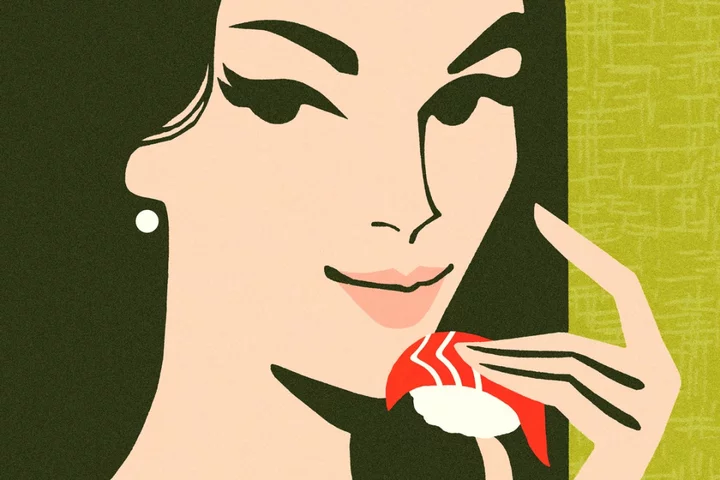
I feel it in my fingers: Why more of us should start eating with our hands
The next time you eat something with your hands, take a moment to notice how it feels on your fingertips before taking a bite. If it’s a burger, are the buns smooth or covered in a smattering of sesame seeds? When you put pressure on them with your fingers, does the bread squish down or is it more of a crumby affair? Then, when you finally take a bite, notice how satisfying it is to sink your teeth through its layers; soft bun giving way to crunchy lettuce or onion, to oozy cheese to, finally, juicy patty. Now think about how different it would be if you had used a knife and fork. Eating with one’s hands is an immensely pleasurable experience. While in the West, the act is usually confined to foods encased in bread or pastry, Indian, African and some other Asian cultures are more adept at using their fingers for dishes that might seem too “messy” or “sticky” on this side of the world. One of my favourite dishes is banana leaf rice, which at its core comprises of rice, vegetables and curry. I mix each element of the dish and use a pinching motion with all five fingers to construct the perfect bite, before sweeping it up in a quick motion and delivering the food to my mouth. I find that it forces me to really consider each bite, from what flavours and textures I want it to contain, to how large a portion I can manage. Up until a few months ago, I never really thought about how often I eat with my hands. Like many people, I associated it closely with Indian meals and always thought that Western culture was too obsessed with polite society to really dig their fingers in. This is still true, to an extent – many South Asians who grew up eating with their hands report being looked at with horror when they attempted to do the same in public here. But, after witnessing my very white British husband happily dig into banana leaf rice when we began dating, and having conversations with friends about the topic, I’ve come to realise that eating with our hands is a much more universal act than I thought. For example, burgers, pizzas, hot dogs and chips are all eaten by hand – unless you’re eating one of those beastly burgers that tower too high and need to be deconstructed. Then there’s things like fried chicken or shellfish, which are simply easier to pick up, pull apart and pry open using your fingers. Foods like Mexican burritos and tacos or Japanese sushi are commonly picked up by hand and devoured. Some people enjoy eating salads by hand, finding it easier to use pieces of lettuce filled with dressing and other ingredients like edible spoons. A surprising proponent of this was Sylvia Plath, who wrote in the third chapter of her 1963 novel The Bell Jar that she observed a poet eating a salad “with his fingers, leaf by leaf”, making it “seem to be the only natural and sensible thing to do”. The more I think about it, the more I realise that my hands are my favourite utensil. No one is delicately picking up crisps with chopsticks or forking a French fry. All manner of flat breads – from parathas and naans to injeras – beg to be torn apart by hands and used to mop up dhal and curry. I would never think of eating a sandwich with a fork and knife, any more than I would for a Taiwanese bao. It just seems wrong. On this side of the world, cutlery has reigned supreme until very recently. Primitive humans have been carving knife and spoon-like implements for centuries, while the fork is a surprisingly modern invention. According to the Smithsonian Magazine, a Byzantine princess debuted a golden fork at her wedding feast in Venice 1006, which disgusted locals who ate using their fingers and knives. One Venetian apparently condemned such a tool and said: “God in his wisdom has provided man with natural forks – his fingers. Therefore it is an insult to him to substitute artificial metal forks for them when eating.” There’s perhaps also an aspect of self-consciousness being thrown out the window when we eat with our hands. It banishes the concept of formality and Anglocentric ‘table manners’ Surekha Ragavan Despite the initial rejection, forks became a mainstay across Europe after 1533 when Catherine De Medici, wife of Henry II, hauled a collection of silver forks from Italy to France in 1533. Three hundred years later, the full set of silverware as we know it had integrated itself into everyday life in Europe. Manners-obsessed Victorians then made up all sorts of etiquette rules, from how to hold a fork, to the myriad of different-sized cutleries with very specific purposes – like fish knives and dessert spoons. These became class markers, separating the upper echelons of society with their dinky utensils from the lower classes, who worked too much to care about which spoon went where. But one thing could be agreed upon – eating with one’s hands was considered impolite and vulgar in almost all culinary situations. That is, until about a decade ago when DeBrett’s, the British authority on etiquette and behaviour, declared in their 2012 guide that “table manners are no longer about adhering to a rigid, and outdated, code of conduct”. The experts named foods like pizza and calzone as “acceptable” foods to be eaten using your hands. It also advised such adventurous eaters to create “as little mess as possible”, sit up straight and ensure you “never put your elbows on the table”, proving that some old habits die hard. Bristol-based restaurateur Rashintha Rodrigo, one of the five founders of Sri Lankan restaurant group The Coconut Tree, says he eats almost anything with his hands – even a roast dinner. “I start with a fork and knife but always find myself picking pieces of chicken or potato off my plate with my fingers towards the end of the meal,” he laughs. He also grew up eating rice and curry with his hands in Sri Lanka, and felt self-conscious about doing the same when he moved to Britain. But these days, he finds it liberating. “It’s become more accepted in the past five or six years and more people are curious about it,” Rodrigo says. Surekha Ragavan, founder of Periuk, a digital archive of heritage Malaysian recipes, also finds freedom in the act. “There’s perhaps also an aspect of self-consciousness being thrown out the window when we eat with our hands. It banishes the concept of formality and Anglocentric ‘table manners’,” she says, reminding me of another observation by Plath in The Bell Jar. The author’s liberation is slightly different, though, as she wrote: “I’d discovered, after a lot of extreme apprehension about what spoons to use, that if you do something incorrect at a table with a certain arrogance… nobody will think you are bad-mannered or poorly brought up. They will think you are original and very witty.” Those who advocate eating with hands often also say it makes the food taste better, but no one seems to be able to pinpoint why. Jose Pizzaro, the acclaimed Spanish owner and founder of the Pizarro group of restaurants, describes it as “the best way to eat”. “It’s a visceral pleasure that’s really hard to beat,” he says. “It creates a sort of magical connection between you and the food. If you’ve never eaten a big, fat, juicy prawn covered with garlic and lemon with your hands, and then go through the ritual of pulling off the legs and the shell and then sucking the brains out – you haven’t lived!” But why is the tactile sensation of touching food so delightful? Some opine that touching your food is beneficial because you can gauge food temperature better with your fingers, and so run a lower risk of burning your tongue. Others claim that your fingers have “healthy bacteria” on them that get transferred into your digestive system when you eat with your hands, but these are difficult to quantify. However, Charles Spence, professor of experimental psychology at the University of Oxford, believes the pleasure lies in our perception of food, as opposed to any other physical benefits. In his review of how the experience of eating changes when people eat with their hands instead of cutlery, Spence found that having more direct, tactile contact with food appears to “enhance the experience” of eating and drinking. “There’s a lot of sensory input that happens even before we put the food in our mouth,” he says. “Just by using our sensitive finger pads, we almost anticipate how tasty something is going to be before it reaches our tongue.” There’s practicality in using our hands to eat, too. We can determine how ripe a fruit is by squeezing it gently, or figure out if something is going to be soft or crunchy before biting into it. Of course, there are some dishes that are simply not hand-friendly. Noodles, pasta and soups obviously require cutlery to eat, but there’s nothing to stop us from taking more joy in the foods we can eat with our hands. If you’ve never tried handling anything beyond a sandwich or a pasty, I fully encourage you to try something new. Take a leaf out of Plath’s book with your next salad, perhaps, or take the plunge into some rice and curry. It will require practice to develop the skill of eating without dropping rice absolutely everywhere, but I promise you, it’s worth it. Read More Adorable, cuddly… evil? How the Furby took over the world ‘You think it’s going to be a money making machine’: How modern life killed the hobby The dish that defines me: Mallini Kannan’s baked honey-soy salmon 30-minute summer recipes for all the family to enjoy What to cook this week: Tomato tart, sweetcorn pasta and other summery suppers The dish that defines me: Mallini Kannan’s baked honey-soy salmon
1970-01-01 08:00
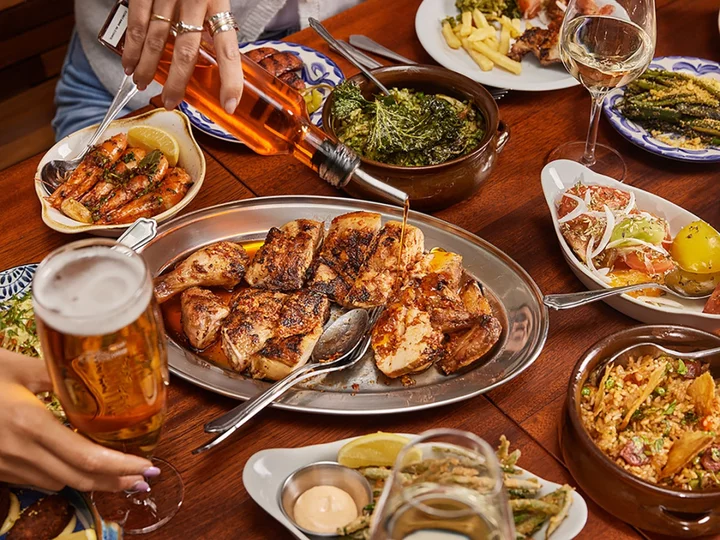
The true story – and murky history – of Portuguese piri piri oil
Most people in the UK think they know piri piri. Thanks to a certain restaurant chain, it is most closely associated with chargrilled chicken, floppy bits of halloumi, corn on the cob and bottomless fizzy drinks. But the chilli oil’s history is a little more nuanced and murky than that. During a recent trip to the Algarve, where “chicken houses” outnumber British expats, I went in search of the truth. While no one can seem to agree on its exact origins, it’s thought that during Portugal’s “mercantile” era, explorers discovered the bird’s eye chilli pepper – the main ingredient in today’s ubiquitous hot sauce – somewhere in the Americas in the 15th century. Seeing its potential to rival the “black gold” (black pepper) trade, they brought it back to their colonies in Africa to cultivate it before selling it on to Asia and Europe, significantly cutting down the shipping time. And so the global spice trade was born. But the plant suited Africa’s hot, dry climate and quickly became an important ingredient in local cooking. Fermenting it in the baking African sun and using it to marinade meat cooked over fire produced the first iteration of the classic piri piri flavour we know and love today. It wasn’t until the late Sixties, however, when Portuguese settlers and native Africans started arriving in southern Portugal, bringing with them this centuries-old technique and an appetite for spice, that it took off globally. Around the same time, chicken was becoming more affordable in Portugal, with poorer families buying whole birds to keep everyone fed and the famous “chicken houses” opening up across the Algarve offering an economical meal out. Pairing it with the piri piri oil brought over from the colonies was a natural evolution. Its enduring popularity is evident in sell-out restaurants like Marufo – affectionately referred to as “the chicken shack” – where come dinnertime there’s a queue out the door. But with 20 chickens rotating on the purpose-built spits at any one time, meticulously tended by a hot in temperature as well as temper chef, service is quick. They churn out over 700 chickens a day. As a self-identified aficionado, it’s some of the best I’ve had. It’s also the place where Marco Mendes, co-founder of MJMK Restaurants, conceived the idea for Casa do Frango, London’s authentic Algarvan piri piri outpost. “I’ve been going to Marufo since I was a kid,” he tells me as we pitch up in the queue. “I took Jake [Kasumov, the other half of MJMK] to stay with my family. We were eating this chicken and we started to have that lightbulb moment of: ‘You know, this is really something special. Could we bring this to London?’” They opened the first site in London Bridge in 2018, and have gone from strength to strength, opening three more sites, with the latest one earlier this year in Victoria. Keeping things authentic in London’s melting pot of cuisines is the driving force behind the concept. Aside from the centrepiece of the menu, the piri piri chicken, “there are other touchpoints like the African rice” – supposedly created at a restaurant in the Algarve as a simple rice dish for staff to use up leftover ingredients – and other things that are particularly Algarvan, such as the montanheira salad (mountain tomato salad), which “really feels like home”, or particularly Portuguese, like “pastel de nata, the iconic custard tart of Portugal”. (“That obviously had to be on the original menu, and it’s been there ever since.”) They’re also the only restaurant using the smaller 800g-1kg chickens, known as chooks, that are traditionally used in the Algarve, which they source from a higher welfare farm in the UK. “We adhere to the authentic route of the dish as it’s done in the Algarve,” Mendes explains. “From how we prepare our chicken to how we choose them to begin with; the fact that we reverse spatchcock them; that we don’t marinate them before they go on the grill, they’re just basted in salt.” So what’s happening at Casa do Frango is pretty unique, and London is lapping it up. “For people who know Portugese cuisine or know southern Portuguese food and have been to the Algarve, I think it really resonates with them,” says Mendes. That being said, Portuguese isn’t a cuisine that’s all that well represented in the British capital or across the country, with only a handful of big name spots (MJMK also counts Nuno Mendes’ Lisboeta in its canon) and smaller, family-run eateries paying true homage. Busting myths is an exercise close to Mendes’ heart. “Eating seasonally, eating with respect to the environment, understanding the ecosystem that you’re living in, that to me is what Portuguese cuisine is,” he explains. “But I also think that there’s a wealth of creativity. Some of the stereotypes around Portuguese food can be that it’s potentially a little bit rustic, or not as flavourful or complex or dynamic as our neighbours in Spain, but I think that’s untrue. I find that there’s so much deft in Portuguese cuisine. “I think the storytelling or marketing side of it has felt quite fragmented, but now amazing chefs from across the country are bringing the message out and telling that story. And I think people are realising just how profound the cuisine is and what it’s got to offer.” He’s quick to acknowledge, though, that the wider cuisine and the offering at Casa do Frango would be nothing without the controversial history that brought the bird’s eye chilli pepper to Portugal in the first place. “It’s definitely to do with Portuguese mercantile history in some form or another,” he says. “But I believe that in turn, we received a ton back from the countries and the people that formed part of that mercantile exploration.” He mentions Japanese tempura, brought by Portuguese missionaries to Japan in the 16th century, or vindaloo curry, which was originally invented as a way to preserve fresh ingredients by Portuguese sailors, and was later adapted by local cooks in Goa. He also says “a lot of our dishes came from the interaction between the Portuguese and their land. Take a dish like açorda [a Portuguese bread soup]. It came from Alentejo. The Portuguese living there need sustenance and nutrition, but they didn’t have any money. So they put a piece of bread and a poached egg in broth, and made what was effectively a savoury bread pudding.” It was a frugal way of filling peasant bellies, but today typically includes a handful of other ingredients like fresh herbs or seafood. Back at Casa do Frango in London, Mendes has some tips on how to have a truly authentic Algarvan experience. “If I were to go through my perfect order that’s truly intrinsic to Portugal, I would start by having the couvert, which is the bread and butter and the carrots and the lupin beans. As a starter, I would have the chorizo and the prawns, because both those dishes are iconic to Portugal. I would dip the bread into the piri piri oil as one should do.” Of course. “And then I would follow that with the patatas fritas [the fries], the African rice and the montanheira salad. Then the piri piri chicken. And I would finish it off with what is the most icnoic Algarvan dessert: the mousse de chocolat.” And, while most of the Casa do Frango recipes are a closely guarded secret, he’s shared exclusively with The Independent a few dishes so that you can host the perfect Algarvan feast at home. Saúde! Casa slaw Ingredients: For the slaw: 1 x hispi cabbage (approx 700-800g) 350g carrots 1 red onion (finely diced) 1 bunch of parsley (finely chopped) Sherry and mustard dressing Pinch of Maldon salt For the dressing: 50ml aged sherry vinegar 150ml extra virgin olive oil 3 tsp Dijon mustard 1 tsp Maldon salt 5 turns of black pepper 2 tbsp caster sugar Method: Mix all the ingredients for the dressing in a large bowl and whisk until fully emulsified. Wash the cabbage, cut in half lengthways, remove the core root and discard any outer leaves if bruised or damaged. Wash the carrots, peel and remove the tops and tails, then grate. Finely shred the hispi cabbage (use a food processor if you have one). Mix the cabbage and carrots together evenly. In a large bowl, mix the slaw with finely diced red onion and the sherry and mustard dressing. Place in a large serving dish and top with a pinch Maldon salt and the finely chopped parsley. Montanhiera salad Ingredients: For the dressing: 75ml white wine vinegar 200ml extra virgin olive oil Large pinch of table salt 1 tsp sugar For the salad: 3 medium green peppers 2 medium white skinned onions (or red onions) 250g cherry tomatoes on the vine 1 cucumber, diced 150ml classic French dressing (shop-bought or homemade) Salt and pepper to season Pinch of dry oregano, to serve Method: Mix all the ingredients for the dressing in a large bowl and whisk until fully emulsified. Pour into a clean bottle and keep refrigerated while you prepare the salad, or save for later. Grill the peppers on the barbecue, turning regularly. Cook for approximately 5 minutes or until the skin is evenly charred. Cool, peel off the skin and discard the seeds, then dice into 1cm cubes. Peel the onion and dice into 1cm cubes. Peel the cucumber, slice in half lengthways, remove the inside with a spoon and dice into 1cm cubes. Wash the tomatoes and slice in half through the eye. Mix the ingredients for the salad with the dressing in a large bowl apart from the oregano, add a pinch of Maldon salt and a few turns of black pepper, and mix well to coat all the ingredients. Serve in a salad bowl, with a sprinkle of dry oregano on top. Classic piri piri oil Ingredients: 5 garlic cloves (crushed to a paste) 1 tsp dried red chilli flakes 1 tsp chilli powder 2 tbsp whisky or brandy 1 tbsp lemon juice 1 bay leaf 1 tsp Maldon sea salt 250ml (1 cup) olive oil Method: Place all ingredients except half of the olive oil in a small pan on a medium heat and bring to a simmer. Then remove from the heat and whisk in the remaining 125ml oil. Cool down and refrigerate until needed. Casa do Frango has four locations in London Bridge, Victoria, Shoreditch and Piccadilly. Find out more or make a reservation at casadofrango.co.uk Read More 30-minute summer recipes for all the family to enjoy What to cook this week: Tomato tart, sweetcorn pasta and other summery suppers Dorshi, Dorset, restaurant review: Funky dumplings are a hit on the south coast Tofu chicken to chickpea bacon – how and why you should make plant-based meat at home The dish that defines me: Mallini Kannan’s baked honey-soy salmon Breakfast for dinner and four other things you should cook this week
1970-01-01 08:00
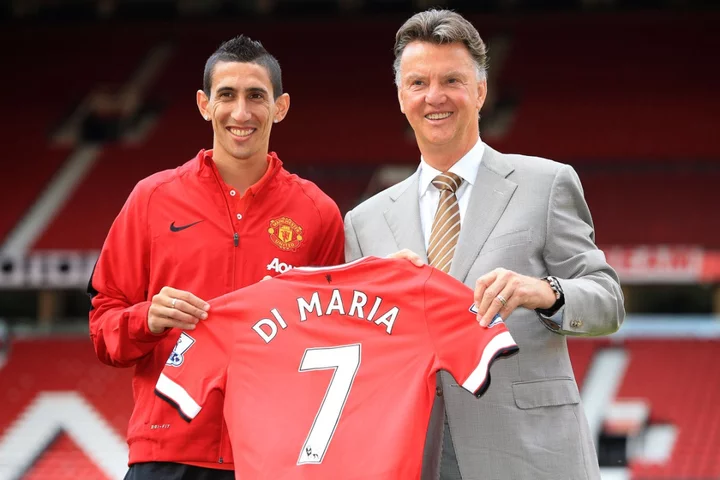
On this day in 2014: Man Utd break British record to sign Angel Di Maria
Manchester United smashed the British transfer record when they completed the signing of Argentina’s Angel Di Maria on this day in 2014. The Red Devils, in a rebuilding phase following the departure of their hugely successful manager Sir Alex Ferguson the year before, paid £59.7million for the then 26-year-old. Di Maria, brought in by the club’s new Dutch boss Louis van Gaal, arrived at United fresh from helping his old club Real Madrid seal their 10th European title the season before. Di Maria said at the time of his signing: “I am absolutely delighted to be joining Manchester United. I have thoroughly enjoyed my time in Spain and there were a lot of clubs interested in me, but United is the only club that I would have left Real Madrid for. “Louis van Gaal is a fantastic coach with a proven track record of success and I am impressed by the vision and determination everyone has to get this club back to the top – where it belongs. I now just cannot wait to get started.” However, things never really clicked for Di Maria at Old Trafford on the pitch. He also endured a fairly miserable time off it, after an attempted burglary at his home in February 2015. Less than a year later, he joined Paris St Germain, and told the French media that he did not have a great relationship with Van Gaal. Di Maria spent seven years at PSG before joining Juventus in 2022. Last year was a special one for him, as he played and scored in the World Cup final as Argentina beat France on penalties. Earlier this summer he rejoined Portuguese side Benfica, his first European club after leaving Rosario Central in 2007. Read More Charity boss speaks out over ‘traumatic’ encounter with royal aide Ukraine war’s heaviest fight rages in east - follow live
1970-01-01 08:00
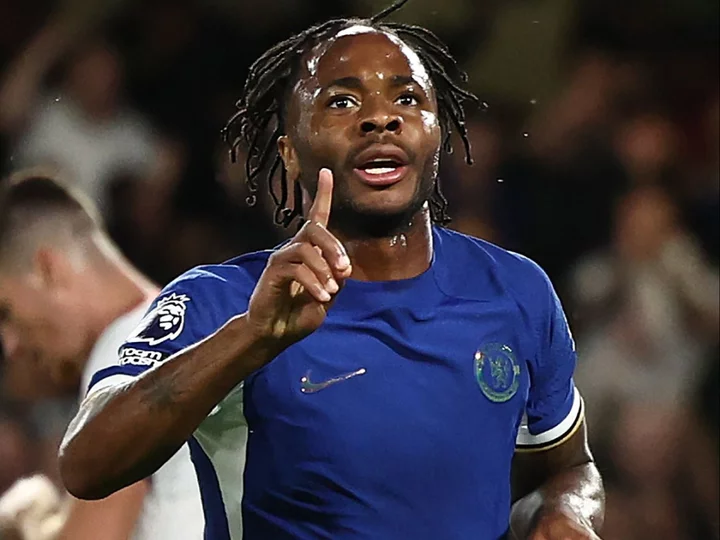
Raheem Sterling proves why he is Mauricio Pochettino’s most valuable player
In offering the finishes, Raheem Sterling now looks like he is starting again. This might well be a great career rebirth, as the England forward’s goals finally launched the Mauricio Pochettino era at Chelsea. The Argentine got his first win at his new club – and a first home win at all for the club since Borussia Dortmund in March – with an otherwise resolute Luton Town beaten 3-0. While the latter was hugely encouraging for Pochettino, this was ultimately all about Sterling. Fittingly for such a fine individual performance, the key goal – and that which essentially set and settled the game – was a sensational solo run. It was like the Sterling of his early years, so much verve and vibrancy, almost impossible to pin down or shackle. The England forward – for that is what he will soon be again if this form continues – just weaved through the Luton defence to slide the ball into the corner. It was like a huge weight had lifted for Stamford Bridge as a whole. The place was flying by the end, just like Sterling. While the forward’s commitment to his physical condition preceded working with Pochettino this summer, it is precisely what the manager demands of his players, especially those who are supposed to lead by example. He wants them ultra-fit. He has got that from Sterling, who also turned the night from a badly needed win to a nicely encouraging display with a fine team goal. While the first reminded how devastating the 28-year-old is when he is allowed to just get on the ball, the second reflected how clinical he was for a time at Manchester City, with just one single touch. After a surging team move, Malo Gusto slid the ball across for Sterling to turn it in. It should be acknowledged that all of this meant more because it wasn’t always so free-wheeling or convincing. The second goal was crucial because Luton had really threatened. The doubt and concerns from the last few months were still very present for so much of this game. They might even have been all the deeper because of the knowledge that, had Chelsea failed to win here, it would have immediately set Pochettino into a “crisis” – no matter how superficial – in the way Frank Lampard and Graham Potter suffered. It would have been impossible to not put those three games without a win into the wider context of last season’s dismal run, extending this miserable streak. There was a long period where Luton sensed that, as they kept getting at Chelsea and caused some moments of nervousness. It will have only played into their mood, too, that many of Pochettino’s line-up had as little Premier League experience as their side. With the Argentine, though, such youth can be a virtue. It has been the source of his best sides. And one thing that can be said for certain right now is that there is already a Pochettino imprint on this team. The very first moment of the game was Enzo Fernandez playing one of those searching balls out wide. It was of course for Sterling, and it was something that used to regularly be seen in Pochettino’s Southampton and Tottenham Hotspur teams. From that, there was an intense pressing, and periods where they were running so hard they threatened to overwhelm Luton. That never happened, though, because the Premier League’s most patronised team also happen to be one of the most defiant. That is how they have overcome so many economic imbalances – and so much else – to get this high. And they were willing to go for it against Chelsea, constantly seeking to exploit an evident gap on the left flank. That is one flaw in the team Pochettino is going to have to work on, but not the biggest. The most obvious is the finishing. It was what made this game so tense for so long. It was like Chelsea had so much right up until the finish. The livewire Jackson was electric until he had the ball in the box, so often opting to pass rather than just go for it in the way he did outside the box. For one huge moment, then, Sterling absolutely blasted the ball at goal only for Thomas Kaminski to hold it. It initially looked like the forward should have scored. On replay, it was so evident it was a remarkable save. Sterling was in that kind of form. He’s got Chelsea back into form. Confidence followed. A goal from Jackson followed. Chelsea, for the first time in a while, can eagerly look forward to what comes next. It will likely be more Sterling quality. Read More Jimmy Floyd Hasselbaink calls for patience at Chelsea under Mauricio Pochettino Ange Postecoglou keen to trim Tottenham squad after James Maddison fitness boost Mikel Arteta: Saudi Pro League transfer window should shut same time as Europe’s Roma officials fly to London for talks with Chelsea over Romelu Lukaku loan deal Chelsea vs Luton LIVE: Premier League result and reaction Chelsea transfer news: Balogun, Olise, Lukaku, Chalobah and more
1970-01-01 08:00
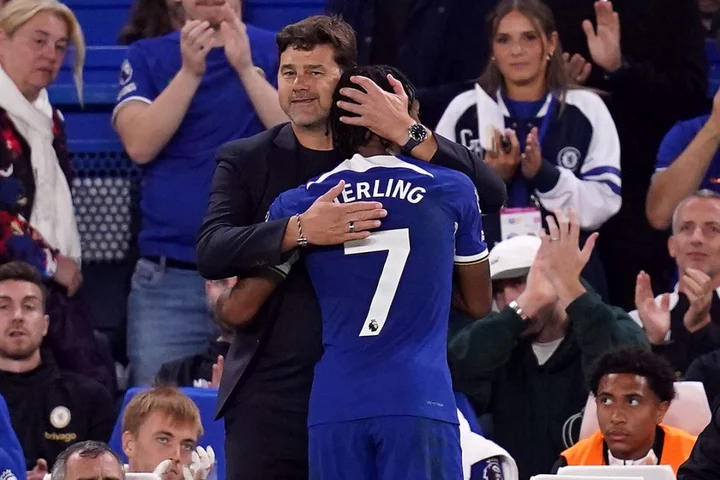
Raheem Sterling deserves credit for renaissance at Chelsea – Mauricio Pochettino
Mauricio Pochettino insisted Raheem Sterling deserves the credit for turning his Chelsea career around after his two goals fired the team to a 3-0 victory over Luton at Stamford Bridge. Sterling endured a disappointing debut campaign in west London but has looked a player transformed since his new manager took charge, and cemented a sensational return to form with a match-winning display against Rob Edwards’ newly promoted side. His first strike was a particularly fine solo effort, cutting in from the wing and beating three defenders before sliding the ball home. But it was his second midway through the second half that transformed the atmosphere inside Stamford Bridge, sweeping first-time into the bottom corner from Malo Gusto’s pinpoint cross. Chelsea’s third – the first time in more than 10 months that they had held a three-goal lead in the Premier League – saw Sterling turn provider as his nonchalant ball driven into the centre was finished off by Nicolas Jackson for his first Chelsea goal. And Pochettino said that ever since his first conversation with the player when he “held up a mirror” and asked him which position he most loves to play, the catalyst for change has all been down to Sterling. “I can only talk from day one when we arrived,” said Pochettino. “We had a conversation. His commitment in the way that he wants to provide and contribute for the team, his work ethic and quality. “I repeat again, I think he deserves the full credit for his performance. We’re very pleased and very happy, he has the quality and he can provide the team goals and assists. Then when we don’t have the ball, working really hard to recover it as soon as possible. “I’m so pleased for him. He told me it was a difficult season for him last season. I’m very pleased when a player is happy, an offensive player who can score and assist, for us it’s the best feeling. “Our first conversation with all the players, our conversation with Raheem, I love to ask the position they love to play, how they feel, how they see themselves; to put a player in front of the mirror. “It’s not the position, it’s the animation and the way the team is going to link in between them. It’s to find the best position, the dynamic of the game when we are playing an offensive situation, to provide the best platform, position and place and link with the player where they can (show) their best quality. “It’s really important, the process. Time to work to create all these links and this animation and to know each other, we need time. When you want to build a team in the process that we are, it’s matter of time.” The crowning moment of Pochettino’s first win in charge came when summer signing Jackson was rewarded for an energetic, committed display by knocking in his first goal for the club. The manager was full of praise for the 22-year-old’s performance and hinted that he has the potential to insert himself amongst the Premier League’s all-time goalscoring greats. “We are not asking for him to run a lot and press and recover the ball, because it is his quality,” said Pochettino. “His work ethic is amazing and then he is fast, to run in behind the defensive line and then the quality into the feet. “It’s only a matter of time that he’s going to score goals also. He’s amazing. It’s difficult to find a player like him in the market. For me he’s going to be one of the great strikers. He has the potential to be.” Despite watching his side lose for the second time in two games since their top-flight return, Luton boss Edwards said his players could hold their heads up after competing well with Chelsea before Sterling’s decisive intervention caused the game to slip away. “We don’t like losing, but I can accept it when there’s a performance like that,” he said. “The players were committed, we gave it absolutely everything. We just came up short in both boxes. I’m extremely proud to be involved with this football club and these players. “We were very resilient and incredibly brave. We went man for man, tried to press them, tried to take the ball. For a time in the second half, we had the territory. I could smell a goal coming, but it was them unfortunately.” Read More Charity boss speaks out over ‘traumatic’ encounter with royal aide Ukraine war’s heaviest fight rages in east - follow live Robert Helenius failed drug test before fighting Anthony Joshua – Matchroom Performance against Tottenham ‘not acceptable’ for Man Utd – Erik ten Hag Dina Asher-Smith upbeat about Olympics after worlds bid hit by mystery problem
1970-01-01 08:00
